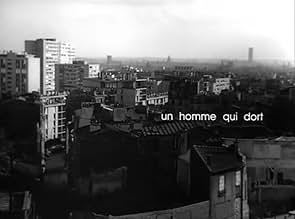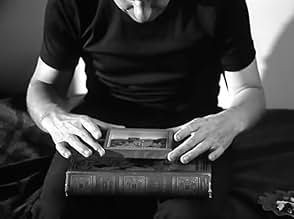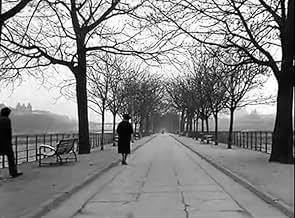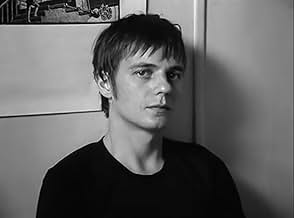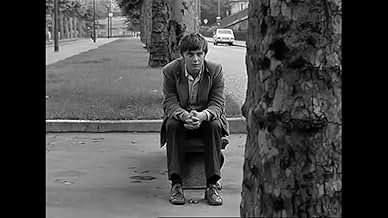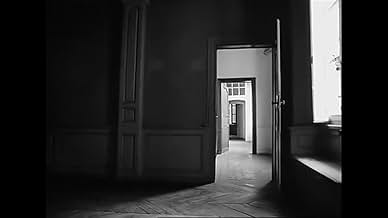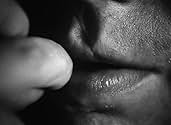Un homme qui dort
- 1974
- Tous publics
- 1h 17min
NOTE IMDb
7,9/10
5,2 k
MA NOTE
Ajouter une intrigue dans votre langueA 25-year-old male student in Paris becomes indifferent to the world around him, and subsequently feels a strong sense of alienation and hopelessness.A 25-year-old male student in Paris becomes indifferent to the world around him, and subsequently feels a strong sense of alienation and hopelessness.A 25-year-old male student in Paris becomes indifferent to the world around him, and subsequently feels a strong sense of alienation and hopelessness.
- Réalisation
- Scénario
- Casting principal
- Récompenses
- 1 victoire au total
Avis à la une
Can anyone imagine a film with a young student,his room and some pigeons ? This is a film which is going to take your breath away. Of course, it cannot be termed as boring. "Un homme qui dort" is surely not for people who guzzle endless quantities of coke, munch umpteen packets of popcorn while watching what they prefer to call "movies". For me personally it was an rewarding visual experience as there are various breath taking images in this film. The black and white photography dates back to 1974 when this film was made. It is true that during those times color films were made. But this film was filmed in black and white in order to heighten the atmosphere related to monotony,dullness. Yeah, for those who have studied French language and literature: This film is based on a book written by Georges Perec. He even collaborated on this film's scenario. A good news for all those who hunt for rare, hard to find videos. This film is available in France with English subtitles.
Perhaps cinema's final word on loneliness, aimlessness, and withdrawal, strikingly filmed in black and white. You may love it or hate it, but you probably have never seen anything like it (or Paris like this) before. *** out of 4.
Famous French writer Georges Pérec was always interested in cinema. He notably took part in Alain Corneau's thriller "Série Noire" (1979) five years after this adaptation of his own novel. Shot by Bernard Quesyanne and awarded with the Jean Vigo prize, the filmmaker found an adequate cinematographic language to capture the somewhat desolate spirit of the novel.
A student who's about to end his studies decides overnight to stay completely indifferent to the world that surrounds him. It's a silent, black & white movie only enhanced by a woman voice over which introduces the young hero to the audience and comments from his own standpoint his actions. Although we don't know the reasons of his retirement from the world, we learn many things of his lifestyle: his bedroom, his wage, his eating habits, his wandering all over Paris etc... It's interesting to note down the mellow voice-over of the woman that gradually gets worried and angered. Indeed, our student is at first completely silent and indifferent but then anxiety, fear overcome here. Is it really possible to stay indifferent like that during a lifetime? Is there a possible exit?
This film could be a cousin of Alain Jessua's debut film "La Vie A L'Envers" (1964) in which a man stops to comply to the routine of everyday life. Such is also the case here. Only the voice-over enables the audience to penetrate the empty soul of this young man and to try to decipher his thoughts although as I previously said his motivations to refrain from social life remain blurred. Through him, Pérec wanted to express his view on French society but in a neutral way. He was always interested in it and showcased it in several of his books especially "La Vie: Mode D'Emploi" (1978). Given the anguished tone adopted by the voice in the second half of the film, the writer probably feels fear towards the banality and the mundane character of everyday life that offers no exits. Perhaps that's what our main hero tries to do: to stay in silence to try to discover another world. But it is bound to fail. So what to do?
Jacques Spiesser is perfectly directed and his expressionless faces capture the nothingness he voluntarily creates all around him. He is at the center of an arty film which tries and succeed to depict the humdrum common life that can verge towards absurdity.
A student who's about to end his studies decides overnight to stay completely indifferent to the world that surrounds him. It's a silent, black & white movie only enhanced by a woman voice over which introduces the young hero to the audience and comments from his own standpoint his actions. Although we don't know the reasons of his retirement from the world, we learn many things of his lifestyle: his bedroom, his wage, his eating habits, his wandering all over Paris etc... It's interesting to note down the mellow voice-over of the woman that gradually gets worried and angered. Indeed, our student is at first completely silent and indifferent but then anxiety, fear overcome here. Is it really possible to stay indifferent like that during a lifetime? Is there a possible exit?
This film could be a cousin of Alain Jessua's debut film "La Vie A L'Envers" (1964) in which a man stops to comply to the routine of everyday life. Such is also the case here. Only the voice-over enables the audience to penetrate the empty soul of this young man and to try to decipher his thoughts although as I previously said his motivations to refrain from social life remain blurred. Through him, Pérec wanted to express his view on French society but in a neutral way. He was always interested in it and showcased it in several of his books especially "La Vie: Mode D'Emploi" (1978). Given the anguished tone adopted by the voice in the second half of the film, the writer probably feels fear towards the banality and the mundane character of everyday life that offers no exits. Perhaps that's what our main hero tries to do: to stay in silence to try to discover another world. But it is bound to fail. So what to do?
Jacques Spiesser is perfectly directed and his expressionless faces capture the nothingness he voluntarily creates all around him. He is at the center of an arty film which tries and succeed to depict the humdrum common life that can verge towards absurdity.
Un Homme Qui Dort is a mesmerizing existentialist trip across different states of mind, with an unusual narrative: only a voice-over speaking out the realizations of the ever-silent, intriguing main character, a student in Paris, who wakes up one day to realize the meaningless of life, and starts discovering the liberation of indifference.
Un Homme Qui Dort is one of the most original, thought-provoking films I've seen in a long time. It effectively portrays an existential crisis, solitude, depression and anxiety, but also peace of mind, using hypnotic, poetic images of 1970s Paris, shot in atmospheric black and white, and accompanied by a haunting soundtrack.
A hidden gem.
Un Homme Qui Dort is one of the most original, thought-provoking films I've seen in a long time. It effectively portrays an existential crisis, solitude, depression and anxiety, but also peace of mind, using hypnotic, poetic images of 1970s Paris, shot in atmospheric black and white, and accompanied by a haunting soundtrack.
A hidden gem.
The man who sleeps is a film from a lonely heart that will let the most lonely person like me love this self observation film.
I reach a point in my that I woke up and just want to experience life, not by sadness but by happiness, and when I stopped everything that bugs me, I found myself alone, and I don't want to return to my sad routine (like if I am in prison in society). I just have myself and deep movies to teach me about life, feel with my pain by a film releasing them and talking and solving them, and when I want to feel happy it make me happy, feeling everything in films, and shows me arts, to see how much life can be beautiful.
But this film is release of everything and every thought I've got in my head in my hole life, it's sad, but it's life at it's most reality. We all want happiness but all that is given to us is sadness, but we will still pursue happiness, and you told me that is this the hole life? I tell you I don't know, because we all try to figure out life, but no one can understand life. So we all have our subjective points of view and we listen to each other to try to emerge them together, but we will never understand life, and we will never appreciate life until we lose it.
I reach a point in my that I woke up and just want to experience life, not by sadness but by happiness, and when I stopped everything that bugs me, I found myself alone, and I don't want to return to my sad routine (like if I am in prison in society). I just have myself and deep movies to teach me about life, feel with my pain by a film releasing them and talking and solving them, and when I want to feel happy it make me happy, feeling everything in films, and shows me arts, to see how much life can be beautiful.
But this film is release of everything and every thought I've got in my head in my hole life, it's sad, but it's life at it's most reality. We all want happiness but all that is given to us is sadness, but we will still pursue happiness, and you told me that is this the hole life? I tell you I don't know, because we all try to figure out life, but no one can understand life. So we all have our subjective points of view and we listen to each other to try to emerge them together, but we will never understand life, and we will never appreciate life until we lose it.
Le saviez-vous
- AnecdotesThe film has several paintings by René Magritte: "La reproduction interdite" (1937), over Man's bed is the most prominent. The surreal cinematography also references "Pilgrim" (1966) and possibly other works of his as well. Also featured over the bed is "Relativity" by M.C. Escher.
Meilleurs choix
Connectez-vous pour évaluer et suivre la liste de favoris afin de recevoir des recommandations personnalisées
- How long is The Man Who Sleeps?Alimenté par Alexa
Détails
- Durée1 heure 17 minutes
- Couleur
- Mixage
- Rapport de forme
- 1.37 : 1
Contribuer à cette page
Suggérer une modification ou ajouter du contenu manquant

